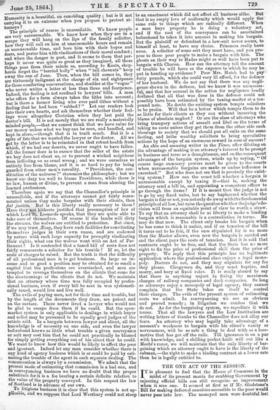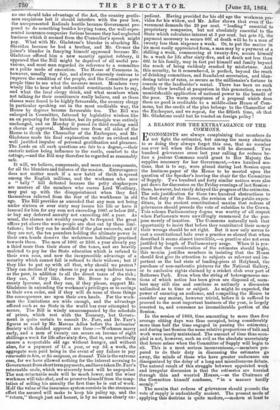THE ONE ACT OF THE SESSION.
IT ispleasant to find that the House of Commons in the midst of its present mania for snubbing Government by rejecting official bills can still recognize an improvement when it sees one. It seemed at first as if Mr. Gladstone's Bill for making deferred annuities accessible to the poor would never pass into law. The moneyed men were doubtful lest no one should take advantage of the Act, the country gentle- men suspicious lest it should interfere with the poor law, the unrepresented Radicals hostile because Government pro- posed to do something besides levying taxes, the well-repre- sented insurance companies furious because they had neglected business which it seemed from the Chancellor's speech might pay. What with Mr. Gladstone's blunder in attacking Mr. Sheridan because he had a brother, and Mr. Cremer the joiner's blunder in fancying himself oppressed because Mr. Gladstone offered him a new security against robbery, it appeared that the Bill might be deprived of all useful pro- visions, and most men regarded its reference to a committee as a polite mode of execution. The House of Commons is, however, usually very fair, and always sincerely desirous to improve the condition of the people, and the Committee gave people time to see what the measure meant. Members very wisely like to hear what influential constituents have to say, and what the local clergy think, and what members when not talking for their constituents really believe, and as these classes were found to be highly favourable, the country clergy in particular speaking out in the most creditable way, the House by degrees became favourable too. The Bill was enlarged in Committee, fattened by legislative wisdom like an ox preparing for the butcher, but its principle was entirely unchanged, and on Monday it passed its third reading amid a chorus of approval. Members rose from all sides of the House to thank the Chancellor of the Exchequer, and Mr. Gladstone made his final explanation under an evident and well justified impulse of personal gratification and pleasure. The Lords on all such questions are fair to a degree,—their esoteric notion being influence to the castle, comfort to the cottage,—and the Bill may therefore be regarded as reasonably safe.
It will, we believe, compensate, and more than compensate, for all the blunders and failures of the session. Extravagance does not matter much if a new habit of thrift is spread among the English millions, and the workman who sees a " tally " bill defeated because the petty shopkeepers are masters of the members who coerce Lord Westbury, may put up with the disappointment when they find themselves relieved from the fear of the workhouse in old age. The Bill provides as amended that any man not being under sixteen or over sixty may insure his life or have it insured for him for any sum not exceeding 1001. or below 201., or buy any deferred annuity not exceedine. 501. a year. As usual, the classes not wealthy enough to frequent the great offices yet above the work-people are shut out by these limi- tations; but they can be modified if the plan succeeds, and if they are not, the ten pounders holding the ultimate power in their own hands deserve the unfairness habitually practised towards them. The men of 1001. or 2501. a year already pay a third more than their share of the taxes, and are heavily mulcted to pay for the State education which is refused to their own sons, and now the inexpressible advantage of a security which cannot fail is refused to their widows; but if they like to put up with all that, why should we protest ? They can decline if they choose to pay as many indirect taxes as the poor, in addition to all the direct taxes of the rich ; they can, if they like, force Mr. Bruce to give them county lyceums, and they can, if they please, support Mr. Gladstone in extending the workman's privileges as to savings to their own order, and if they will do none of these things the consequences are upon their own heads. Fer the work- men the limitations are wide enough, and the advantage offered such as no State in the world has ever attempted to secure. The Bill is wisely unaccompanied by the schedule of prices, which rest with the Treasury, but Govern- ment is quite certain to consult Dr. Farr, and Dr. Farr's figures as read by Mr. Marcus Idles before the Actuaries' Society with decided approval are these :—Workmen marry early, and a man of twenty can secure an income of eight shillings a week for life after sixty-five, that is, can practically ensure a respectable old age without hunger, and without alms, for a payment of 11. a year, or say 5d. a week, the aggregate sum paid being in the event of any failure to pay returnable to him, or his assignees, on demand. This is the extreme case, for we have allowed nothing for the interest accruing to Government from short term payments, and have takenDr. Farr's returnable scale, which we sincerely trust will be unpopular. The nonreturnable scale will be much lower, and the wiser workman will take that, and so preserve himself from the temp- tation of selling his annuity the first time he is out of work. Half the value of the insurance system consists in the strenuous effort the assured will make to keep his policy up, and the " return," though just and honest, is by no means clearly ex- pedient. Having provided for his aid age the workman pro- vides for his widow, and Mr. Adler shows that even if Go- vernment demands the 20 per cent. "loading " essential to proprietary companies, but not absolutely essential to the State which calculates interest at 3 per cent. but gets 3}, the payment necessary to secure 601. at death will be to a man of twenty less than sixpence a week. Or, to put the matter in its most easily appreciated form, a man may by a payment of a shilling a week, commencing at twenty-five, secure himself 8s. a week for life after sixty-five, and at death not less than 601. to his family, may in fact put himself and family beyond the reach of being suddenly crushed by misfortune. And this security, be it remembered, is perfect, beyond the reach of drinking committees, and fraudulent secretaries, and blun- dering tables of rates, as secure as the millionaire's fortune in consols or the landholder's rental. There has been no such deadly blow levelled at pauperism in this generation, no such unmistakeable application of national power to the benefit of the poor. The warm acceptance of a proposal which does them no good is creditable to a middle-class House of Com- mons, but the credit of the plan belongs to the Chancellor of the Exchequer, and we repeat, for the fiftieth time, oh that Mr. Gladstone could but be trusted on foreign policy !































 Previous page
Previous page